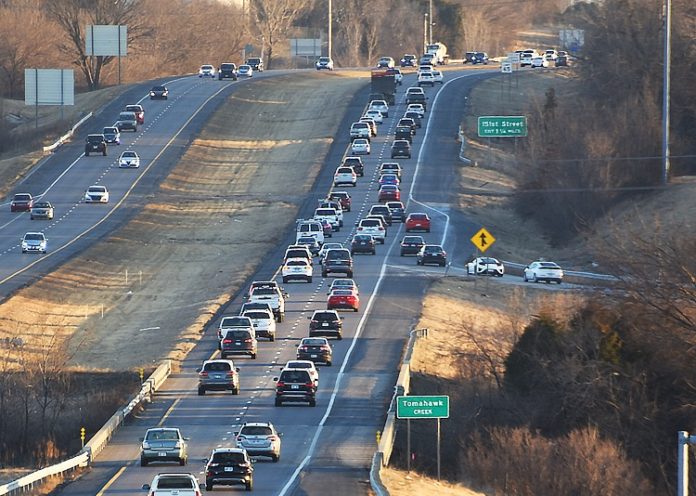Gov. Laura Kelly and leading lawmakers on Thursday approved Kansas’ first express toll lane, breaking ground for relieving traffic congestion in the Midwest.
The state Finance Council approved the $300 million toll lane that will serve a highly congested section of U.S. 69 in Overland Park from 103rd Street to 151st Street.
Plans call for widening the highway to three lanes in each direction, using the additional lane for motorists who are willing to pay a toll to drive with less traffic.
The goal is to give drivers an option to use a less-congested lane that would free up traffic from the rest of the highway.
The toll would fluctuate depending on the time of day and the volume of traffic, possibly costing between 75 cents and $1.75 to travel the corridor.
It is the first toll project built apart from the Kansas Turnpike, which covers 236 miles of the state.
And Kansas would be just the first Midwestern state to employ tolled express lanes.
Design and contruction are set to start next year with a 2025 completion date.
Two years ago, the Legislature authorized new tolling when it changed state law so tolls no longer had to cover the entire cost of a highway project, meaning that tolling could be used beyond the turnpike if it made sense.
Kansas already has a long history of tolling with the turnpike compared to a state like Missouri, where the idea of tolling has been controversial for 50 years.
Express lanes, however, are a different approach to managing traffic for Kansas and the Midwest.
Overall, there about 700 miles of tolled express lanes in the United States, with most of them concentrated in Texas, California and Florida where traffic is more frustrating for rush-hour drivers.
Texas has the most with 332 miles of tolled express lanes, many of them in the Dallas-Fort Worth area. There are 207 miles in Florida, most of them in the Miamii area.
Some states such as Minnesota have variations of what’s planned for Kansas, but they are toll lanes for cars with single drivers or lanes that are set aside for carpoolers.
In the Midwest, there is generally not enough traffic congestion or economic development to merit tolled express lanes, experts said.
“A lot of times, those tolling solutions — those managed lanes solutions — are really about solving big, hard, urban challenges,” said Kyle Schneweis, a transportation consultant who previously led the Nebraska Transportation Department.
“And there just aren’t a lot of those challenges in the Midwest,” he said. “That’s why you haven’t seen as many.”
Ron Achelpohl, director of transportation at the Mid-America Regional Council, said other areas of the country have reached congestion levels that warrant express toll lanes faster than Midwestern cities.
“Historically, we have been about 20 years behind other metros, even our size, in terms of congestion,” Achelpohl said.
“It would make sense that these areas have gotten to the point where (the lanes) make sense…would have done that sooner than we would have here,” he said.
“That’s going to be true in places like Omaha, Des Moines and St. Louis.”
Schneweis, who previously worked for the Kansas Transportation Department, said tolls might become more attractive to governments looking for alternative sources of funding to pay for infrastructure.
“All sectors of government are trying to find ways to accomplish things, and there’s just more and more examples of different arrangements than there used to be,” he said.
“Some of those things are finally making their way into the Midwest, and so you’re starting to see them,” he said.
Schneweis said the Kansas project is an example of a community coming up with a creative way to solve a problem it’s facing.
In this case, Overland Park is trying to relieve traffic on a vital north-south artery that connects southern parts of the Kansas City suburbs to the rest of the metro area.
The corridor serves an area that generates an estimated $7 billion in economic activity and serves more than 10,000 businesses and 225,000 residents.
It is home to 11% of the state’s labor force.
An estimated 80,000 drivers use the route each day, and it’s expected to increase to between 120,000 and 130,000 by 2050.
The money from the toll — an estimated $20 million by 2042 — would go toward covering Overland Park’s share of the cost of the project.
While critics have said the toll lane would be inequitable and benefit the affluent, supporters of the toll lanes note that everyone who drives the highway will benefit from the overall reduced congestion.
And supporters of toll roads in general have argued that they’re a better option than taxes that would force Kansans who don’t necessarily drive to pay for a road that they wouldn’t use.
Julie Lorenz, the Kansas Transportation secretary, said there is an overall savings by using a toll lane as an option because it allows the state to reduce congestion without building more highway lanes beyond the toll lane.
Lorenz said there is a goal of balancing the toll so it’s low enough to entice drivers to use the lane but high enough so that not everyone will use it.
“When you can offer your customer a relatively free-flow lane, then you don’t have to go build lanes four, five and six,” she said.
“That is where the true savings comes in, because you don’t have to keep building more, more and more,” she said.
The question is where might a similar strategy be considered in the future.
Generally, it could only work in urban areas where there’s sufficient traffic to generate toll revenue, something that has limited Kansas in the past from pursuing tolls.
Transportation planners have looked at tolling the South Lawrence Trafficway in the past, but it was ruled out because of a lack of traffic.












